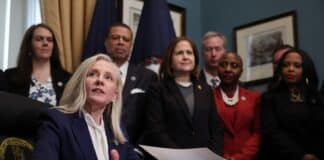The Supreme Court decided that the government can order social media companies to remove damaging disinformation from their platforms, which is a victory for the Biden administration.
A lower court ruling that restricted the government’s ability to communicate with social media companies was overturned by the justices in a 6-3 decision. They reasoned that the challengers, two states and five social media users, had not provided enough evidence to support their claim that they were the appropriate parties to file the lawsuit.
The lawsuit is a result of the Biden administration’s efforts to disseminate accurate information about COVID-19 during the pandemic by requesting that social media firms remove inaccurate remarks about the virus or vaccines. Lawsuits from Missouri and Louisiana claimed that the government “coerced” the businesses to take down the posts, violating their First Amendment rights.
However, the states and users suing did not prove they were harmed, therefore the Supreme Court ruled that their requests did not amount to compulsion.
“The plaintiffs fail, by and large, to link their past social media restrictions and the defendants’ communications with the platforms,” Justice Amy Coney Barrett wrote for the majority opinion.
The states targeted the Biden administration for what they believed to be a coordinated public and private pressure campaign to suppress conservative viewpoints, speakers, and content online. The targets included two infectious disease epidemiologists who disagree with Covid, an anti-mask advocate, the owner of the conspiracy theory website The Gateway Pundit, and a psychiatrist who opposed lockdown mandates. This is arguably one of the most buzzword-heavy cases of the term.
They claimed that the Biden administration “coerced” social media businesses to remove false information about vaccines and the pandemic, the 2020 election’s legitimacy, the reality of Hunter Biden’s laptop narrative, and other public health issues.
Louisiana’s Solicitor General said at oral arguments in March that the government had been persistently pressuring social media companies to take down particular content and intimidating them by implying that high-ranking White House officials were involved.
The government, however, denied putting pressure on social media firms, claiming that it had only asked them to take false material down from their platforms that would jeopardize public safety, health, or the presidential election.
According to Deputy US Solicitor General Brian Fletcher, communications between government representatives and journalists or social media sites on specific content are frequent occurrences.
After serving in the executive branch in the late 1990s, Justice Brett Kavanaugh concurred, noting that public relations specialists at the White House would “regularly call up the media and berate them.”
Fletcher maintained that although the government’s requests were scary at times, they were not coercive. But the most important question during oral arguments was whether the plaintiffs had established their “standing,” or that the Biden administration’s actions had caused them injury or could cause them harm in the future.
Due to their incapacity to “point to any specific instance of content moderation that caused them identifiable harm,” the Supreme Court ruled that they did not. In their dissenting opinions, Justices Samuel Alito, Clarence Thomas, and Neil Gorsuch said that the government’s requests had censored “valuable speech” regarding vaccinations and the epidemic.
“Our country’s response to the COVID–19 pandemic was and remains a matter of enormous medical, social, political, geopolitical, and economic importance, and our dedication to a free marketplace of ideas demands that dissenting views on such matters be allowed,” Justice Alito wrote.
“I assume that a fair portion of what social media users had to say about COVID–19 and the pandemic was of little lasting value. Some was undoubtedly untrue or misleading, and some may have been downright dangerous. But we now know that valuable speech was also suppressed. That is what inevitably happens when entry to the marketplace of ideas is restricted.”





